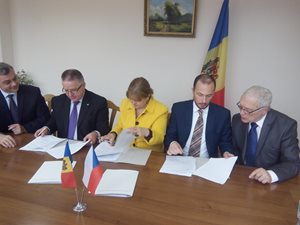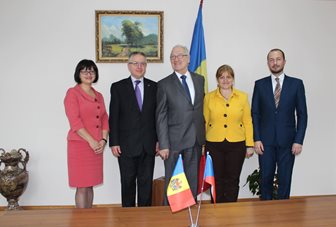Support of transformation in Moldova
Project full name:
Support of transformation process of care for people with mental disorders and people with learning difficulties in Moldova
 Contracting Entity:
Contracting Entity:
Czech Development Agency
www.czda.cz
Project Aim:
An increased expertise of stakeholders who will perform transformational changes in the Moldovan mental health care system.
Key Activities:
1. Support for the transformation of 4 residential care institutions: three psychoneurological institutions for adults, in Brinzeni, Cocieri, and Balti, and one institution for mentally handicapped girls in Hincesti
Results:
Mapping of these residential institutions
Four transformational action plans for these institutions
2. Educating the participants in the Moldovan transformation in a modern approach to people with mental illnesses and learning disabilities
Results:
8 coaches trained in the Czech Republic (scope of training: 40 hours)
45 people trained in Moldova (scope of training: 40 hours)
3. Sharing the Czech experience with transformation with Moldova
Results:
16 leaders of the transformation in Moldova will undertake internships in the Czech Republic
4. Support of the transformational process in Moldova from Czech experts
Results:
Situational analysis and a feasibility analysis of transformation with regards to the local situation (31/12/2015)
Written recommendations for the Ministry of Labour, Social Protection and Family
Draft - Strategy for a Mental Health Care and Protection Reform
5. Information about the project, support of the destigmatization of people with mental illnesses and disabilities
Results:
Continuous provision of information about the project
Support of destigmatization
Conference on the project’s results
Project Partners:
Czech Republic:
- Centrum podpory transformace, o.p.s. (
www.podporatransformace.cz)
Moldova:
- People in Need, o. p. s. (
www.clovekvtisni.cz),
- Keystone Human Services International Moldova Association (
www.keystonemoldova.md)
The project will be conducted in close cooperation with the Ministry of Labour, Social Protection and Family (
www.mmpsf.gov.md)
We also expect cooperation with other organizations who take part in reforms and development in the field of mental health care.
Time frame: 1 September 2015 – 30 September 2017
Contact: Pavel Říčan,
rican@cmhcd.cz, +420 775 552 166
News in the project
---------------------------------------------------------------------------------------------------------------------------------------
Final conference of the Project
The final conference of the „Deinstitutionalization process in the Republic of Moldova, achievements and perspectives” project was held on October 31, 2017, with the participation of clients of institutional care. Thanks to the project, clients have been involved in the planning of social services and the care transformation process. The lecturers evaluated the contribution of the Czech project up to now as well as the prospects for the oncoming period. The Minister of Health, Labour and Social Protection declared their commitments to implement the reform of deinstitutionalization and social inclusion of people with disabilities in the Republic of Moldova. Pavel Říčan, Director of the CMHCD, together with People in Need, our project partner, evaluated the support of the DI process in Moldova through a Czech project, which have involved transformation plans for six residential care institutions. The directors of these institutions then shared their experience of the transformation process, talking about how they were preparing and moving clients into community care. Jan Pfeiffer, an expert at the DI, presented his experience of the transformation process in the Czech Republic and European countries. Peer specialist Zdeněk Heřt shared the Czech experience of the involvement of persons with mental illness in the field of social services and advocacy.
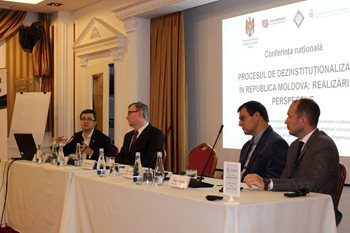
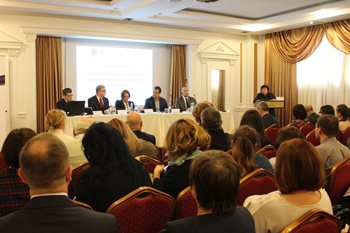
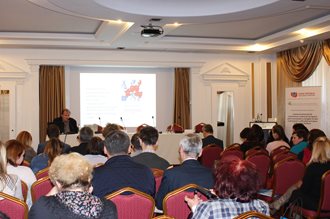
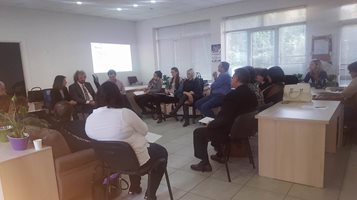
--------------------------------------------------------------------------------------------------------------------------------
Meeting of the transformation teams is an important tool in the transformation process
The meeting helps in sharing experience, mutual support, identifying new topics for solutions at the level of ministries and regions.
In the first half of 2017, the transformation teams of each institute met twice.
Workshops took place in groups, mostly across facilities, to encourage mutual collaboration, interconnection and knowledge exchange between different facilities.
----------------------------------------------------------------------------------------------------------------------------------------
2016
The whole project has significantly moved forward during 2016. The Ministry of Labour, Social Protection and Family (MPSOR) has formally accepted the Action Transformation Plans for all institutes.
Thanks to this project, the institutes have changed their status, from now on they can legitimately establish community services outside the institute - approved by MPSOR. The responsibility of directors is to set up community services. The transformation plans have become a binding document.
Besides, the use of institutes budgets for house and apartment purchases has been approved by the Treasury.
In the following year 2017, the Ministry of Labour, Social Protection and Family will draw up the National DI Program.
-------------------------------------------------------------------------------------------------------------------------------------
At the end of June, a training program for Moldovan mentors was held at the Centre, led by a project partner, the CPT (Transformation Support Centre).
The purpose of the program was to educate professionals who would support the transformation of institutional care by further training the staff, transferring experience, motivating them to change their approach in care provided to their clients.
The mentors came from Moldovan institutional facilities, from the Ministry of Labour, Social Protection and Family and from their local NGOs.
The training was divided into two parts:
- two-day teaching in Moldova on deinstitutionalization, its aims, principles, the difference between life in the institution and in community
- a five-day educational program in the Czech Republic, which alternated teaching sections and visits to different types of facilities
Mrs. Alena Brozkova, former director of the institution called Domov bez zámku (“Home without a door-lock”), shared the experience of transforming the institute. The principle of individual planning and client support was explained to the mentors by Terezie Hradílková, expert in transformation methodology. The mentors visited the transformed institute and sheltered housing in DSS Slatiňany. Inspiration to support people with disabilities in order to be able to live independently, work and live according to their wish, was provided to them by the non-profit organizations Skok do života (“Jump into the Life”) in Hradec Králové and Rytmus o.p.s. in Prague. Further, our peer specialist Jiří Štefl shared his experience, explaining to the Moldovan mentors the role of peer specialists, people with their own experience of mental illness.
The participants have got inspiration from the direct actors of the transformation in the Czech Republic and at their departure they were motivated for the necessary changes in the field of deinstitutionalisation in Moldova.
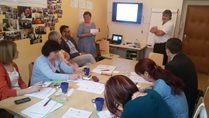
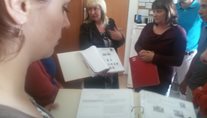
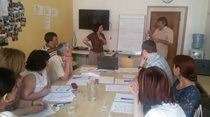
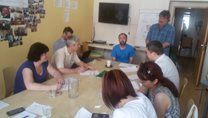
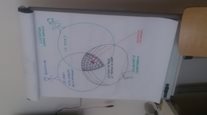
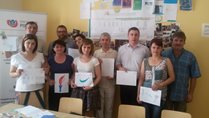
------------------------------------------------------------------------------------------------------------------------------------------
At the end of May and at the beginning of June 2016, we received the representatives of ministries, NGOs and institutions for people with mental illnesses and learning disabilities from Moldova
Within the four-day internship program, our Moldovan colleagues heard the story of the complete closure of the Social Care Institute in Brandys nad Labem, which has gradually been replaced by other services supporting the lives of people with disabilities in more common conditions. With the staff of Vyšší Hrádek we have visited the "Home for the Disabled" service with different levels of support, located in the common households in the city.
Inspiration about how the non-profit organizations help people with disabilities to integrate into everyday life was interesting not only for representatives of the non-profit sector in Moldova. They were interested in discussing with Jurta Děčín's staff about what the "Social Therapeutic Workshops" offer, how they improve the level of self-sufficiency of their clients, but also about their involvement in the activities on the farm and many others.
Our Moldovan colleagues also received valuable information from the director of the Fokus Labe service. In her presentation she highlighted how community care is crucial to recovery. Our peer specialists shared their experience in managing mental illness, showing that recovery is possible, which gives hope to the clients and their families. Our Moldovan colleagues have been inspired during a visit to the Vaňova cuisine, an example of employing mentally ill people, where up to 800 products are prepared each day to supply all their facilities. Together we also visited Fokus Kafe and their sheltered housing.
On the occasion of the visit of representatives of Moldovan ministries and heads of institutes, a press conference was held with representatives of the Czech Development Agency and the Centre for Mental Health Care Development. Moldovan media representatives appreciated the direct engagement of institutional staff in the transformation of care, the diversity of services developed by NGOs to support the integration of people with disabilities into society and in the open labour market. It is the way they want to go in Moldova. They also expressed thanks for the support the Czech Republic provides them with.
The process of care transformation in the Czech Republic has been presented to Moldovan representatives also during their visit of the Ministry of Labour and Social Affairs, where they were also interested in legislation related to the care provided to people with disabilities.
We shared our experience of employing disabled people at the AdAstra Café. The friendly atmosphere and the charm of the service (people with disabilities) have confirmed the Moldovan partners that they have gone the right way. Examples of Czech good practice have allowed Moldovan colleagues to change their way of thinking about people with disabilities and to see them more in their potential.
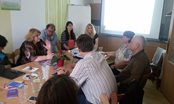
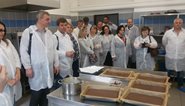
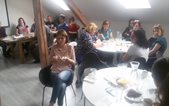
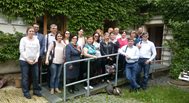
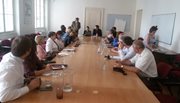
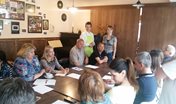
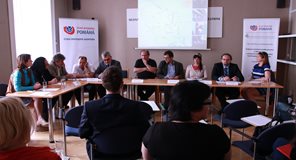 ---------------------------------------------------------------------------------------------------------------------------------------
---------------------------------------------------------------------------------------------------------------------------------------
In March 2016, directors and their teams have started creating of transformation plans for their institutions
A „transformation team“ led by the institution director has been established in each of the 4 residential care institutions. Their mission is to create a transformation plan for the development of community-based services and transfer of clients from residential institutions to these services.
Under the leadership of chief expert of the Project, MD. Jan Pfeiffer, directors and their teams are being introduced to the different transformation proceedings and models. They quickly apprehend the idea of transformation, participate in the planning process and come up with constructive ideas on how the institutions could create services for their clients.
The transformation plans for different residential care institutions will be completed and approved by the Ministry of Labour, Social Protection and Family by the end of 2016.
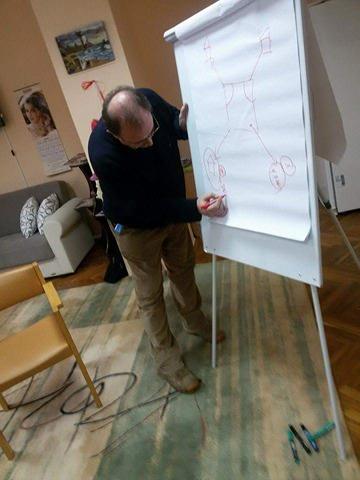
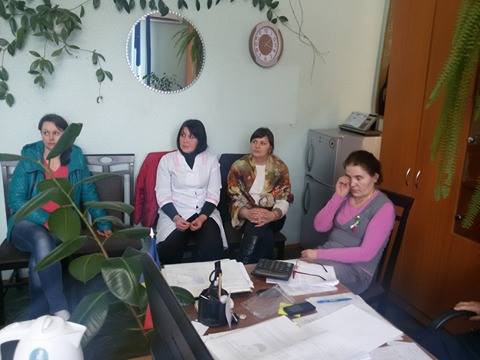
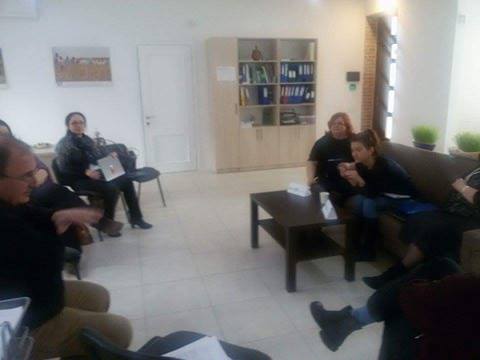
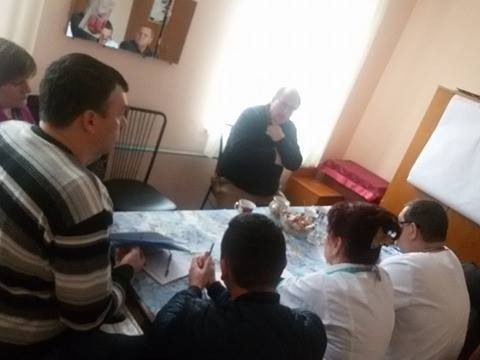
------------------------------------------------------------------------------------------------------------------------------------------
Provision of the Coordination Council
On the initiative of the chief expert of the Project, Jan Pfeiffer, a working group called Coordination Council has been established by the representatives of the Ministry. The Council, consisting of relevant representatives of the Ministry and the NGOs as well as the residential care institutions directors, was not established solely for the purpose of the CMHCD Project management. It has a wider deinstitutionalization view and will take part in the preparation and implementation of the Strategy for a Mental Health Care and Protection Reform in Moldova.
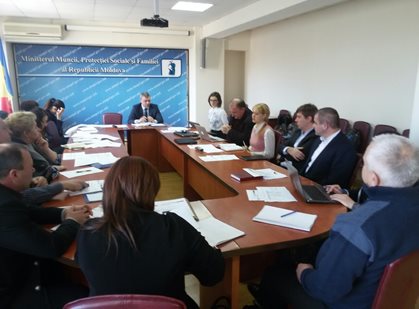
--------------------------------------------------------------------------------------------------------------------------------------
Signing of Memorandum of Understanding
On the November 12, 2015, a representative of the Moldovan Ministry of Labour, Social Protection and Family together with the Project partner organizations have signed the Memorandum of Understanding. The memorandum of cooperation between the Project partners aims to meet Project objectives, namely improvement of living conditions of people with mental disabilities, accenting the respect of human rights in Moldova. The Memorandum have been concluded between the following partner organizations: Centre for Mental Health Care Development (Project implementer), Ministry of Labour, Social Protection and Family of the Republic of Moldova, People in Need (registered branch in Moldova), Keystone Human Services International Moldova Association and Centrum podpory transformace (Transformation Support Center).
The Memorandum of Understanding includes the following fields of activities:
- Support for the transformation of 4 residential care institutions
- Training of the main deinstitutionalization actors in a modern approach to people with mental disabilities
- Sharing the Czech transformation experience with Moldova
